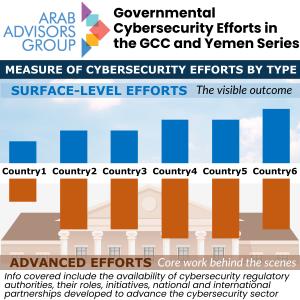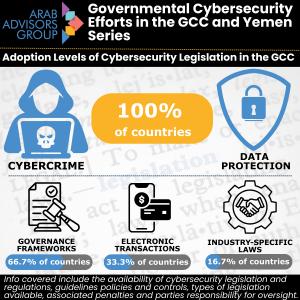All GCC countries claim cyber readiness; only 1 in 6 protect industry-specific digital operations

Cybersecurity efforts in the GCC vary, with each country showing a unique mix of surface-level & advanced government efforts, revealing disparities in their digital security approaches
As cyber threats grow in scale and sophistication, governments across the GCC region are under immense pressure to secure national digital assets and maintain trust in public and private digital services. Arab Advisors Group’s new series offers a first-of-its-kind, in-depth analysis of how each country is building its cyber defense from the ground up; through authorities, laws, and national strategies. The series is indispensable for policymakers seeking to benchmark and strengthen national frameworks; cybersecurity consultants and ICT strategists advising on compliance and risk; risk managers evaluating cross-border regulatory exposure; digital transformation leaders ensuring secure execution of digital agendas; system integrators aligning their services with national priorities; and international cyber technology vendors assessing market entry or partnership potential. Each report offers country-specific intelligence and strategic insight to help stakeholders navigate shifting regulations and shape resilient digital security strategies across the region.
“Governments across the GCC are taking measurable steps to strengthen their national cybersecurity postures; however, our analysis reveals notable disparities in the scope and maturity of their efforts. While all GCC countries have enacted baseline cybersecurity and data protection laws, only one-third extend coverage to electronic transactions, and just one country incorporates industry-specific regulations, highlighting critical gaps in regulatory depth.” said Hiba Rabadi, Managing Director of Arab Advisors Group. “This series offers a structured, comparative view of how each government is approaching digital resilience through regulatory bodies, legal frameworks, and national strategies. By uncovering both common objectives and implementation gaps, the reports are a vital resource for entities aiming to navigate regulatory environments, assess market readiness, and align with the region’s evolving cybersecurity landscape.”
What sets Arab Advisors Group apart is our two-decade legacy of region-specific, actionable market intelligence, backed by field research, localized expertise, and strong relationships with government and industry stakeholders. Unlike generic global datasets or surface-level regional snapshots, this series offers country-by-country dissection of cybersecurity regulatory bodies, legal frameworks, strategic visions, and implementation mechanisms. With firsthand access to primary sources and policy movements, Arab Advisors Group provides insights that competitors often overlook. For businesses and institutions serious about cybersecurity positioning in the Gulf and Yemen, this series offers unmatched clarity and strategic foresight.
The Governmental Cybersecurity Efforts in the GCC and Yemen series was released in March 2025 to Arab Advisors Group’s telecom research subscribers and is also available for individual purchase. The first report (Regulatory Authorities) is priced at US$ 5,000, while the second (National Cybersecurity Strategies) and third (Legislations and Regulations) reports are available at US$ 4,500. For more information, to request the Table of Contents, or to purchase the report, please contact Rula Jabr at rula.jabr@arabadvisors.com or call +962.6.560.7737.
Arab Advisors Group has been a reliable source of telecom, media, and technology research in the Arab World since 2001, serving over 1,000 clients both regionally and globally and publishing over 6,100 reports. To learn more or view our client list, visit https://arabadvisors.com/client-list.
Rula Jabr
Arab Advisors Group
+962 7 9615 1136
rula.jabr@arabadvisors.com
Visit us on social media:
LinkedIn
Facebook
YouTube
X
Legal Disclaimer:
EIN Presswire provides this news content "as is" without warranty of any kind. We do not accept any responsibility or liability for the accuracy, content, images, videos, licenses, completeness, legality, or reliability of the information contained in this article. If you have any complaints or copyright issues related to this article, kindly contact the author above.
Flat Steel Market Gains Momentum with 6.00% CAGR, Poised to Cross USD 817.20 Billion by 2032
Recovered Carbon Black: A Circular Economy Opportunity Worth USD 4.1 Billion by 2032
Swimming Pool Treatment Chemicals Market to Reach USD 1.53 Billion by 2032, Growing at a CAGR of 2.39%
Więcej ważnych informacji
 Jedynka Newserii
Jedynka Newserii

 Jedynka Newserii
Jedynka Newserii

Polityka

Polska może się stać Doliną Krzemową Europy. Potrzeba jednak wsparcia finansowego start-upów i mocniejszej deregulacji
Polskie start-upy skoncentrowane są głównie na rozwoju nowoczesnych technologii informatycznych i cyfrowych. Wyraźny nacisk na oprogramowanie i aplikacje oraz big data i data science wskazuje na silne zainteresowanie narzędziami analitycznymi i rozwiązaniami wspierającymi transformację cyfrową w różnych branżach – wynika z raportu „Rynek start-upów w Polsce. Trendy technologiczne”, który został opracowany w 2024 roku w MRiT. Zdaniem europarlamentarzystów Polska ma szansę się stać Doliną Krzemową, jednak rozwój start-upów blokowany jest m.in. przez ograniczony dostęp do finansowania oraz niekorzystne i nadmierne regulacje.
Transport
Na półmetku wakacji ceny paliw na stacjach nie powinny się wyraźnie zmienić. Znaczące różnice między regionami i stacjami

W sierpniu ceny benzyny, oleju napędowego i autogazu powinny pozostać na poziomach z lipca – uważa ekspertka rynku z firmy Reflex. Wyższe będą zawsze na stacjach premium, tych, które oferują bogatszą ofertę dodatkową, promocje dla uczestników programu lojalnościowego, oraz w regionach, w których tradycyjnie paliwa są droższe ze względu np. na wyższą siłę nabywczą mieszkańców. Różnice mogą sięgać kilkudziesięciu groszy na litrze. Obszary, wokół których te wartości oscylują, zależą z kolei od sytuacji globalnej. Warto patrzeć na sytuację na Bliskim Wschodzie i w Ukrainie.
Polityka
A. Mularczyk (PiS): Nawiązanie poważnego dialogu z Niemcami jest konieczne nie tylko w kontekście reparacji. Powinien być podpisany traktat polsko-niemiecki

– Nie wystarczy jednorazowy gest czy inicjatywa. To musi być podjęcie dialogu, być może też przygotowanie nowej umowy bilateralnej, nowego traktatu polsko-niemieckiego, który regulowałby wszystkie obszary, które wynikały ze skutków II wojny światowej – mówi Arkadiusz Mularczyk, poseł do Parlamentu Europejskiego z PiS-u. Podkreśla, że proces ten nie będzie łatwy, bo wymaga konsekwencji i stanowczości, ale widzi szansę w prezydenturze Karola Nawrockiego, który już zadeklarował kontynuację starań w tym zakresie. Zdaniem europosła wsparciem w polsko-niemieckim dialogu może być administracja Donalda Trumpa.
Partner serwisu
Szkolenia

Akademia Newserii
Akademia Newserii to projekt, w ramach którego najlepsi polscy dziennikarze biznesowi, giełdowi oraz lifestylowi, a także szkoleniowcy z wieloletnim doświadczeniem dzielą się swoją wiedzą nt. pracy z mediami.





![Nestlé w Polsce podsumowuje wpływ na krajową gospodarkę. Firma wygenerowała 0,6 proc. polskiego PKB [DEPESZA]](https://www.newseria.pl/files/1097841585/fabryka-nesquik_1,w_85,r_png,_small.png)




.gif)

 |
| |
| |
|